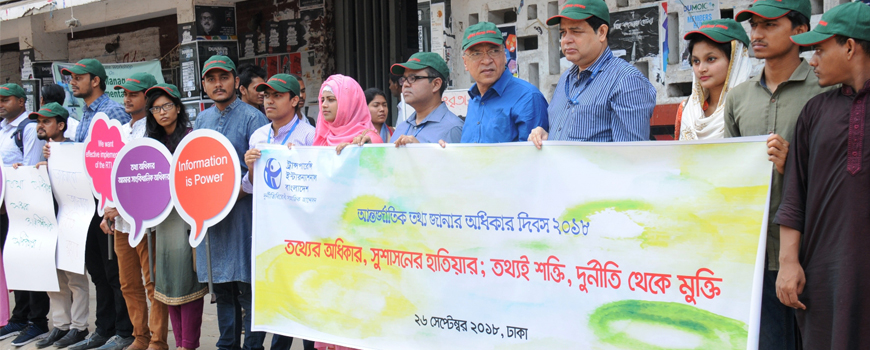Published: 26 September 2018

Transparency International Bangladesh (TIB) observed the International Right to Know Day, 2018 with a call upon the government to review the hastily passed Digital Security Act ignoring widespread protests and concerns from journalists, media, rights activists, civil society and different national and international quarters. Observing the legislation contradictory to the true spirit of Right to Information (RTI) Act 2009, the Liberation War and freedom of expression, TIB also urged the president not to assent to the bill at this stage terming some of its provisions risky for journalists, media, researchers as well as for the masses and push it back to the Parliament for reviewing the controversial provisions.

Referring freedom of expression and right to information as the fundamental rights of the people, Executive Director of TIB Dr. Iftekharuzzaman said, the Right to Information (RTI) Act is exceptional as it gives people the right to hold the government accountable and the Digital Security Act will create greater risk of insecurity not only in expressing opinion freely but also in practicing basic human rights of both the media workers and mass people if the act comes into effect without proper reviews. Speaking at a human chain organized by TIB on 26 September at Dhaka University's Teacher-Student Centre (TSC) marking the International Right to Know Day (RTK) 2018, Dr. Zaman expressed fear that wide misuse of the act by the members of the law enforcement agencies would happen as the act has given them the power to check and arrest anyone without any warrant. He added that Digital Security Act would endanger the people of their basic human rights and be an impediment to the way of flourishing democracy in the country. Terming the act as a `black law’, Dr. Zaman said, we are not opposing the act, but we are just demanding amendment to some sections. On inclusion of the colonial Official Secrets Act into the Digital Security Act, Dr. Zaman said, it is a backward thinking and a threat to investigative journalism. He hoped that the government would take steps to reconsider the act’s controversial sections. Among others, members of Dhaka Youth Engagement and Support (YES) groups and TIB staff attended the human chain.
The day was celebrated nationally from 25-30 September. Beside highlighting on raising awareness among people and service providers on RTI Act and encouraging pro-active disclosure of information by both public and private sectors, TIB’s this year’s RTK day national celebration also carried out demand of amending the risky and controversial sections of Digital Security Act. Among other demands included inclusion of private sector, political parties and media in the RTI act; review of necessary corrections in RTI act such as amending provision of providing personal details of the applicant and allowing anonymous requests etc.

Earlier on 25 September, as part of its celebration, TIB and Information Commission jointly organized a day-long capacity-building orientation focusing on RTI act where 52 young volunteers from Bangladesh Scouts, Bangladesh Girl Guides Association and Bangladesh Red Crescent Society participated. Held in TIB’s Dhaka office, the event was attended by Chief Information Commissioner Mr. Martuza Ahmed and Information Commissioner Mr. Nepal Chandra Sarker of Information Commission Bangladesh, and TIB ED Dr. Iftekharuzzaman.
As one of the organizing institutions, TIB officials and Dhaka YES members also participated in 3-day long programme spearheaded by Information Commission, Bangladesh comprising rally, discussion meeting, cultural programme and information fair to mark the RTK Day 2018. At the discussion meeting followed by rally on 30 September, Information Minister Hasanul Haq Inu, MP attended the programme as the Chief Guest, and Chief Information Commissioner Mr. Martuza Ahmed, Information Commissioners Mr. Nepal Chandra Sarker and Ms. Suraiya Begum ndc were among others who participated the event.

Beside central initiatives, TIB’s Committees of Concerned Citizens (CCCs) and Youth Engagement and Support (YES) groups voluntarily working with TIB at 45 locations across the country also undertook a series of public awareness campaigns in partnership with local authorities and non-government institutions for enforcement of people’s right to information. With full support of the local administration, which was made possible after TIB's sustained advocacy with the relevant government and non-government organizations set up stalls in information fairs. TIB's pioneering Information Fairs, which proved to be a powerful medium of strengthening both the demand and supply side in implementing RTI Act, are now being replicated by some NGOs. The awareness campaigns included rallies, human chains, street theatres, sticker campaign, advice and information desks, cultural programmes, seminars, discussion meetings and anti-corruption cartoon and photo exhibitions. The theme of TIB’s this year’s RTK Day celebration is `Tothyer Odhikar, Shushashoner Hatiyar; Toththoi Shakti, durniti theke mukti’ (Right to information is a tool of good governance; Information is power to get rid of corruption).
TIB played an instrumental role in the enactment of the Right to Information Act 2009 adopted in the Parliament on 29 March 2009, which became operational in July 2009. TIB has been observing the RTK Day since 2006, as the first organization to do so in Bangladesh. Earlier, from 2003, TIB started a local level campaign called `Advice and Information Desk’ to make the people aware of their basic rights and entitlement.







